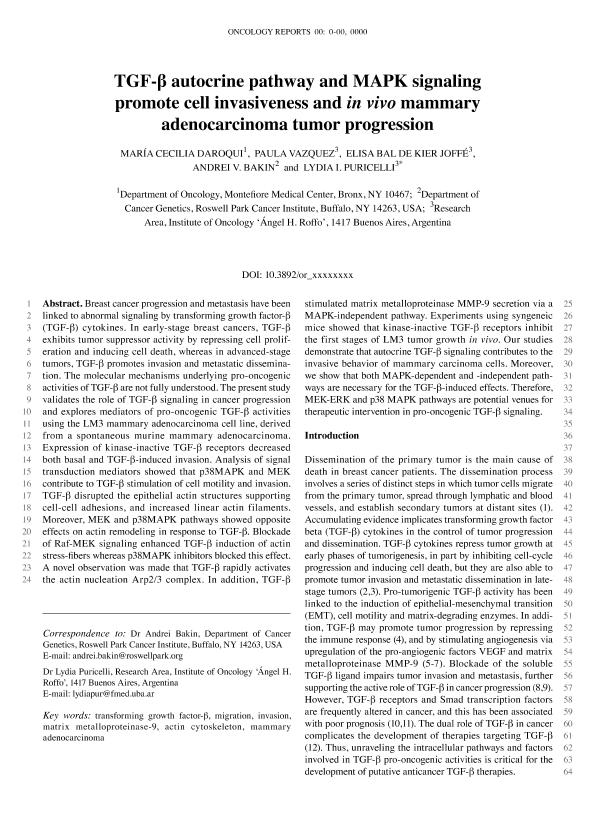Artículo
TGF-beta autocrine pathway and MAPK signaling promote cell invasiveness and in vivo mammary adenocarcinoma tumor progression
Fecha de publicación:
08/2012
Editorial:
Spandidos Publ Ltd
Revista:
Oncology Reports
ISSN:
1021-335X
Idioma:
Inglés
Tipo de recurso:
Artículo publicado
Clasificación temática:
Resumen
Breast cancer progression and metastasis have been linked to abnormal signaling by transforming growth factor-beta (TGF-beta) cytokines. In early-stage breast cancers, TGF-beta exhibits tumor suppressor activity by repressing cell proliferation and inducing cell death, whereas in advanced-stage tumors, TGF-beta promotes invasion and metastatic dissemination. The molecular mechanisms underlying pro-oncogenic activities of TGF-beta are not fully understood. The present study validates the role of TGF-beta signaling in cancer progression and explores mediators of pro-oncogenic TGF-beta activities using the LM3 mammary adenocarcinoma cell line, derived from a spontaneous murine mammary adenocarcinoma. Expression of kinase-inactive TGF-beta receptors decreased both basal and TGF-beta-induced invasion. Analysis of signal transduction mediators showed that p38MAPK and MEK contribute to TGF-beta stimulation of cell motility and invasion. TGF-beta disrupted the epithelial actin structures supporting cell-cell adhesions, and increased linear actin filaments. Moreover, MEK and p38MAPK pathways showed opposite effects on actin remodeling in response to TGF-beta. Blockade of Raf-MEK signaling enhanced TGF-beta induction of actin stress-fibers whereas p38MAPK inhibitors blocked this effect. A novel observation was made that TGF-beta rapidly activates the actin nucleation Arp2/3 complex. In addition, TGF-beta stimulated matrix metalloproteinase MMP-9 secretion via a MAPK-independent pathway. Experiments using syngeneic mice showed that kinase-inactive TGF-beta receptors inhibit the first stages of LM3 tumor growth in vivo. Our studies demonstrate that autocrine TGF-beta signaling contributes to the invasive behavior of mammary carcinoma cells. Moreover, we show that both MAPK-dependent and -independent pathways are necessary for TGF-beta-induced effects. Therefore, MEK-ERK and p38 MAPK pathways are potential venues for therapeutic intervention in pro-oncogenic TGF-beta signaling.
Palabras clave:
Mammary Cancer Cell Line
,
Tgf B
,
Mapk Signaling Pathways
,
Tumor Progression
Archivos asociados
Licencia
Identificadores
Colecciones
Articulos(OCA HOUSSAY)
Articulos de OFICINA DE COORDINACION ADMINISTRATIVA HOUSSAY
Articulos de OFICINA DE COORDINACION ADMINISTRATIVA HOUSSAY
Citación
Daroqui, Maria Cecilia; Vazquez, Paula; Bal, Elisa Dora; Bakin, Andrei V.; Puricelli, Lydia I.; TGF-beta autocrine pathway and MAPK signaling promote cell invasiveness and in vivo mammary adenocarcinoma tumor progression; Spandidos Publ Ltd; Oncology Reports; 28; 2; 8-2012; 567-575
Compartir




